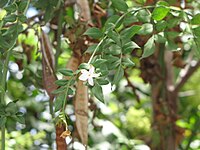
Photo from wikipedia
Abstract Background insect herbivory, i.e. the minor but chronic plant damage caused by insects, is usually considered ‘negligible’ for plants when compared with the severe defoliation associated with forest pest… Click to show full abstract
Abstract Background insect herbivory, i.e. the minor but chronic plant damage caused by insects, is usually considered ‘negligible’ for plants when compared with the severe defoliation associated with forest pest outbreaks. We experimentally tested the hypothesis that the impacts of background herbivory on tree growth and mortality accumulate over years, resulting in much larger effects than usually assumed. In boreal taiga forests near Arkhangelsk (Northern Russia), application of insecticide at 10-day intervals for four growth seasons (June–September of 2014–2017) decreased foliage losses to insects in our study species (early successional deciduous Betula pubescens and Populus tremula; late successional coniferous Picea abies and Pinus sylvestris) from 2.04–6.35% to 0.72–1.18%. The magnitude of the insecticide treatment effect on plant losses to defoliating insects varied considerably among the study species, with the highest effect observed in white birch and the lowest effects in the two late successional species. Across all tree species, insecticide treatment nearly doubled the increase in tree biomass relative to control plots, demonstrating that background insect herbivory has major negative impacts on tree growth and productivity. The insecticide-treated plots showed the largest increase in biomass in Norway spruce and the smallest increase in European aspen when compared to the control plots. The changes in birch growth following the release from insect herbivory were three times greater than the effects of the same level of simulated herbivory in an earlier experiment, thereby hinting at the importance of herbivore-specific elicitors in the growth suppression of trees damaged by insects. The mortality of late successional species in the treatment plots increased nearly three-fold, whereas the mortality of early successional species did not change relative to controls, suggesting an increase in competitiveness of the early successional trees released from herbivory. Thus, in agreement with an earlier modelling study, we conclude that minor herbivore damage, over the long term, substantially reduces biomass production in North European forest trees. Due to differential effects on coexisting tree species, this damage has a pronounced impact on plant competitiveness and affects both the productivity and the structure of boreal forests.
Journal Title: Forest Ecology and Management
Year Published: 2020
Link to full text (if available)
Share on Social Media: Sign Up to like & get
recommendations!